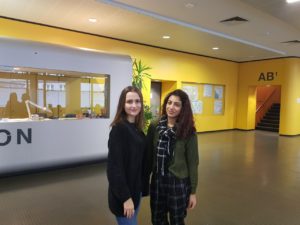Since many years, the University of Hamburg has been striving to become a „university of sustainable future“, promoting the importance of sustainable behavior, developing innovative approaches and putting sustainability initiatives into action. Written by Anastasia Barabash, Hiba Khan und Mariana Furnari.
Yesterday
The sustainability activities within the University of Hamburg fall into four main dimensions:
- Ecological dimension: dealing with such important issues as climate change, energy- and water use, waste management etc.;
- Economic dimension: focusing on expenditures control, support of local businesses, etc.;
- Social dimension: ensuring diversity, gender equality, equal chances for all, work-life balance, parental leave, etc.;
- Teaching, research and transfer dimension: integration of sustainability topic into all disciplines, critical reflection of sustainability topics, development of new approaches and transformation of the best ideas into practice.
In order to insure the feasibility of sustainability activities within the university and foster sustainability in research, education and government, the University of Hamburg’s Center for a Sustainable University (German: Kompetenzzentrum Nachhaltige Universität (KNU)) was established in 2011. It is an internal interdisciplinary platform that brings students, faculty, and administrative staff together to insure a holistic approach to sustainability actions.
In 2012, the student organization Oikos Hamburg initiated the development of the first UHH Sustainability Report covering the period between 2010 and 2011. In 2015, the second Sustainability Report for 2011–2014 was developed in line with Global Reporting Initiative (GRI). This was a huge step towards transparency of university practices and sustainability progress. It ensures a dialogue with all stakeholders and generates positive publicity. However, both reports are available only in German, thus, limiting the chances of a broader reach. Moreover, since then, no updates were provided, making it difficult to assess the current stage of the progress.
In the winter semester of 2013–2014, the Master of Arts in International Business and Sustainability (MIBAS) was inaugurated. It was created with the aim to bring together students from different cultural backgrounds and initiate them into the real challenges faced by companies and society in the pursuit of sustainable business strategies. The program currently continues to grow a sense of critical thinking and responsibility into students by exposing them to the social, ecological, ethical and political implications of doing business, thus preparing the aspiring leaders of the future.
Today
University of Hamburg, having a specialized focused center for sustainability and ecological awareness provides an incredible platform for students and enthusiasts to actively engage in sustainability topics. One of such an event is the „Sustainability Action Days“, which allows participants to delve deeply into a sustainability challenge, understand its root cause and initiate a possible solution. The University of Hamburg is currently engaging in more than 400 sustainability-related research projects located in all the faculties. In order to provide an overview of these, the university has launched an online interactive map that is updated regularly. These research projects, which cover a broad range of current sustainability challenges, is aligned with the UN’s sustainability Development goals in the areas of Basic Needs, Empowerment, Climatic Change, Natural Capital, Sustainable Infrastructure and Governance.
Furthermore, the University of Hamburg supports student-lead initiatives. One of such an activity is the MIBAS Debate, a panel discussion event that brings leading experts and students together with the aim to combine theoretical knowledge and practical insights. These debates are led by the MIBAS students and are completely in English language, giving the opportunity to a broader audience to spark the debate. These events are often focused on a prevailing and concerning sustainability challenge from an industry perspective and it brings together different stakeholders who share their points of view and experiences. The biggest advantage of this initiative is that it offers a two-way communication between students and practitioners, allowing both to learn from each other. Some of the topics covered by the MIBAS Debates are related to the energy transition, sustainable food consumption or sustainable sourcing, among others.
The University of Hamburg has progressively become more engaged in sustainable practices and sustainability research in the recent years. Their participation in the HOCHN, a project funded by the German Federal Ministry of Education and Research with the goal to foster sustainable development at Higher Education in Germany, has initiated the path for a collaborative future.
Tomorrow
The future of sustainability in the University of Hamburg is related to the inclusion of practices that respond to the sustainability crisis and the wicked problems of our society. The path started by the University should be continued to incorporate projects that aim to increase ecological literacy of society in general. Inclusive education, critical thinking, cross-disciplinary, diversity-oriented and institutionalized sustainable practices should be the standard. All disciplines and faculties need to incorporate sustainability-related courses with a practical based approach that present the current sustainability challenges to students and practitioners, in order to foster problem solving skills and research.
Furthermore, the future of the University of Hamburg should be oriented towards a mission that includes the co-creation of societal transformations for advancing social well-being, environmental improvement, equal opportunities, economic development and entrepreneurship. In the hands of the University of Hamburg lies the responsibility and the challenge to work harder towards sustainable development practices, for instance, through an increased cooperation with international organizations, start-ups and global research projects or through supporting diversity in academic and student positions. In this sense, government policy makers and university decision makers need to coordinate their actions to makes it a reality. Collaboration is, and should be, the main engine for a sustainable future.
